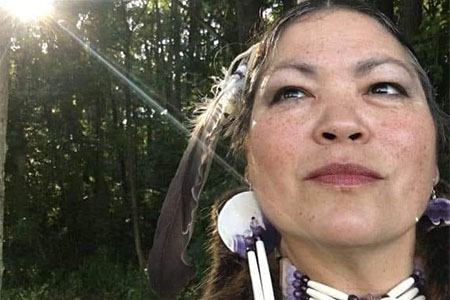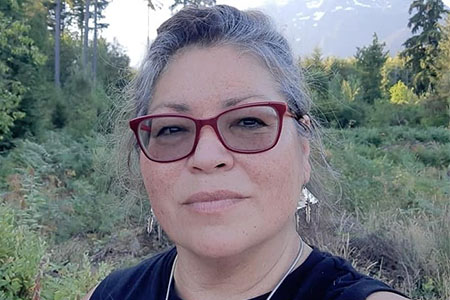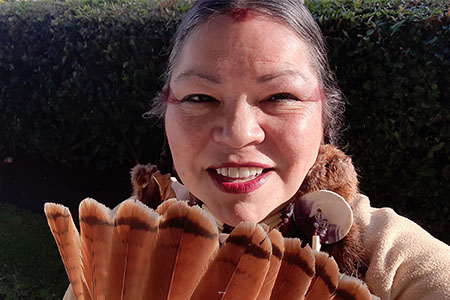7 questions for the 7th Generation – Renée Roman Nose, MAIS ’18
Renée Roman Nose, MAIS ’18, is the Oregon Department of Education's Native American student success coordinator. We asked about her diverse professional experiences — including writing books and acting — and heard about her time at Oregon State and what made an impact on her.
How was your experience as a student at Oregon State University? Any moment(s) that were remarkable or changed your future?
I learned a great deal while studying in my program, worked 7 part time jobs while in grad school at OSU. As a non-traditional student with children, it was incumbent upon me to ensure their needs were met first and foremost. I’m grateful that my professors understood and supported the priority of family first. What changed my life were the friendships established with students, administrators and teaching staff, many of which I have gratefully retained years later.
What is your opinion on the progress of the university toward addressing the Native and Indigenous communities associated with the University?
It is my opinion that the university is moving toward improving their relationships with the nine federally recognized tribes here in Oregon, which can only benefit students attending OSU in learning more about their tribal neighbors, as well as improving graduation rates of Native students seeking to achieve their academic goals at OSU.

In 2009, you played Camille in the movie Some Days Are Better Than Others. Was this a project you pursued, or did it pursue you? How was the experience of acting? Any interest in continuing acting?
The Native American Longhouse (now KIMIH) had received a request for students to audition for Some Days Are Better Than Others, written and directed by Matt McCormick (who now teaches film in Washington State). One of my fellow Native students, Christine Marta, asked me to audition. She was quite shy when we first met, but she blossomed while at OSU and by her senior year was organizing panels and gatherings. I was a frequent speaker on campus and often brought other Native students with me, telling them, “I won’t always be here, but these requests will be and each of you need to learn how to do this.” While I had included Christine in many of the presentations around campus, she had never asked me for anything in return, until she asked me to audition for this film. There were many valid reasons for saying no, however, I felt I owed it to Christine to honor her request.
I read the script and it was fascinating. I walked into the audition with a clear view of the character I hoped to portray. I did the read through and then was invited to ask any questions. I asked if I could act out the final scene for Camille (there were only 5 or 6 scenes for this character originally). Both Matt and the casting director looked surprised as that scene has no talking, but they allowed me to do it. I think that is what solidified my casting in the role, which they both confirmed later. Matt McCormick appreciated my audition so much that he went back in and rewrote the part, adding several scenes and giving it the only complete story line of any character in the film. I have been acting since I was a freshman in high school, participating in high school and community theater. I have also appeared in other films, done commercials, voice work, radio interviews and modeling throughout my life thus far.
If the right project came along, I would be interested in acting again. It’s very exciting to see roles written and portrayed by Native people in film and television right now. Marlon Brando and Sacheen Littlefeather would be very proud, as they paved the way for accountability and genuine portrayal of Native people in film and television productions, which we are now seeing in the new “Predator” movie, “Prey,” and in television series such as “Reservation Dogs.”
You are the author of “Sweet Grass Talking: Poems,” “Have War Paint, Will Travel” and an untitled, collaborative book of poetry with Suzan Harjo. Of the three, which one has been most impactful for you and why?
“Sweet Grass Talking: Poems” was published by Uttered Chaos Press in Eugene, Oregon, and was the first book I had published. “Have War Paint, Will Travel” has more comedic poetry in it, while the first one is far more focused on historical to contemporary Native issues and lives. I’m continuing to work on the third, with Suzan Harjo, who graciously suggested we collaborate on a book of poetry. I’m honored to work with her, she’s an amazing human being who has worked tirelessly her entire life to support treaty rights and honor our Indigenous people.
I recently released “River of Life,” a spoken word CD with musical accompaniment by Peter Ali, a Native flute player who lives here in the Pacific Northwest and is highly regarded for his skill. This recording was done at Sleeping Bulldog Studios in Snohomish, Washington, and published by Bison Disc. While Peter and I had performed together many times over the years, we had not had a professionally produced CD until this one. I’m humbled by how well it turned out and grateful for the team that put it together. Performing my poetry at events is my favorite way to share my work as I can integrate comedy and poetry into the performance, which is very fun for me and my audiences.
The most impactful would have to be “Sweet Grass Talking: Poems” as it was my very first publication.

You are/have been a trainer with the Native Wellness Institute. Describe this experience and how you have benefitted from this experience.
Native Wellness Institute (NWI) has been providing positively affirming training for several years. I was able to be there from the beginning as Jillene Joseph, the founder, reached out to many people asking for input into this idea, originally. I remember telling her it was a great idea, and I wanted to be a part of it. I’ve been honored to have conducted many trainings across the country and in Canada on behalf of NWI. I have benefitted by learning, taking many of the trainings myself, and learning from those communities to which I have been invited.
In 2015 and 2018, you wrote an article for Indian Country Today titled “Climate Change: Mankind Must Stop Destroying Our ‘Mystical Place,’” which highlighted the discussions and conclusions of the attendees at the Affiliated Tribes of Northwest Indians Tribal Leaders Summit on Climate Change. What are your experiences with climate change?
We are seeing the effects of the climate crisis right now, before our eyes. We have had wildfires in the winter of this year, continuing into late October with high temperatures (87 in October), and yet more wildfires. I continue to remind people to live near clean water, yet our country is not focused on providing clean water, as evidenced by Flint, Michigan. We continue to see severe droughts across America and the world. We see that the climate crisis is affecting plants, animals and some of our ceremonies.

In June 2021, you were the guest alumna speaker at the Native and Indigenous virtual graduation ceremony held by Kaku-Ixt Mana Ina Haws. Describe this experience and its importance to you.
I was honored to be chosen to speak at the Native and Indigenous virtual graduation ceremony. It moves me to think of that event. This was truly one of the best experiences I have had the privilege of having in my lifetime thus far. My numshim (grandfather) often told me, “Granddaughter, go as far as you can!” I share this with students frequently. Go as far as you can. As Indigenous people, education in America has been fraught with violence, oppression, genocide and theft of our children. So, to see our Native students succeeding within systems that are not designed for us is truly inspiring. I will always cherish being the guest alumna speaker at the OSU graduation and I continue to urge all students, “Go as far as you can.”
Don’t just chase your dreams, make them your reality.

